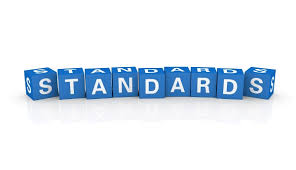standard
英 [ˈstæn.dəd]
美 [ˈstæn.dɚd]
- n. 标准;水准;旗;度量衡标准
- adj. 标准的;合规格的;公认为优秀的
- n. (Standard)人名;(英)斯坦达德;(德)施坦达德
使用频率:

中文词源
standard 旗杆,旗帜,标准,规范
来自古法语 estandart,军旗,旗帜,等同于 stand hard,字面意思即稳固站立。引申词义标准, 规范等。
英语词源
- standard
-
standard: Standard ‘flag, banner’ [12] denotes etymologically something that is ‘extended’ or unfurled. The word comes from Anglo-Norman estaundart ‘flag displayed on a battlefield so that troops can rally to it’. This was a derivative of Old French estendre ‘extend’ (first cousin of English extend). The sense ‘criterion, norm’, which emerged in the 15th century, is probably a metaphorical application of the notion of the ‘royal standard’ or banner as being the point from which authoritative commands (as of standards of weight and measurement) are issued. Standard ‘upright object, such as a tree’ [13] is probably an alteration of stander.
=> extend; stand - standard (n.1)
- mid-12c., "flag or other conspicuous object to serve as a rallying point for a military force," from shortened form of Old French estandart "military standard, banner." According to Barnhart and others, this is probably from Frankish *standhard, literally "stand fast or firm," a compound of unrecorded Frankish words cognate stand (v.) and hard. So called because the flag was fixed to a pole or spear and stuck in the ground to stand upright. The more common theory [OED, etc.] calls this folk-etymology and connects the Old French word to estendre "to stretch out," from Latin extendere (see extend). Some senses (such as "upright pole," mid-15c.) seem to be influenced by if not from stand (v.). Standard-bearer in the figurative sense is from 1560s.
- standard (adj.)
- 1620s, "serving as a standard," from standard (adj.). Earlier it meant "upright" (1530s). Standard-bred "bred up to some agreed-upon standard of excellence" is from 1888.
- standard (n.2)
- "weight, measure, or instrument by which the accuracy of others is determined," late 14c., from standard (n.1) "military standard, banner," a particular use in English of this word, but the sense evolution is "somewhat obscure" [OED]. The standard weights and measures were set by royal ordinance and were known as the king's standard, so perhaps metaphoric, the royal standard coming to stand for royal authority in matters like setting weights and measures. Hence the meaning "authoritative or recognized exemplar of quality or correctness" (late 15c.). Meaning "rule, principal or means of judgment" is from 1560s. That of "definite level of attainment" is attested from 1711 (as in standard of living, 1903).
权威例句
- 1. The London Evening Standard moved offices a few years ago.
- 《伦敦标准晚报》报址几年前迁走了。
- 2. The standard of living today is on the edge of subsistence.
- 现在的生活水平几乎快要无法维持生计。
- 3. Residents in general are poor and undereducated, and live in sub-standard housing.
- 居民们普遍都很贫穷,受教育程度低,居住条件较差。
- 4. It carried off the Evening Standard drama award for best play.
- 它获得伦敦晚间标准戏剧奖的最佳戏剧奖。
- 5. Generations of students have learnt to parrot the standard explanations.
- 一代又一代学生学会了机械地重复这些标准解释。
